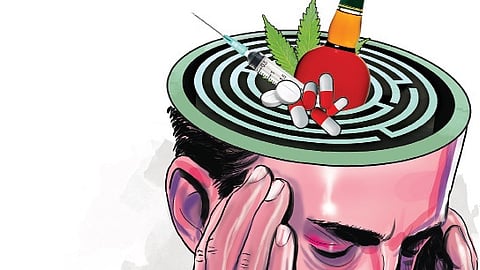Deaddiction and the sleeping devil
When someone is indulging in excessive consumption of alcohol or is abusing an addictive substance, those close to that person frantically think of deaddiction. In most instances, they are too late, as the person would have already marched towards the severe complications of addiction.
Withdrawal symptoms become matters of concern. The individual may have already started chasing the substance or alcohol at the expense of all other activities. Relationships with the potential to save may have been lost due to addiction. Job loss and financial strains may add to the burden.
Sadly, all these psychosocial adversities do not gain enough strength to pull him/her out. With biological and psychological handicaps due to a brain chained by addictive substances, the person fails to build the motivation to escape. It is at this point that many are pushed into deaddiction.
There are situations where individuals are forced into treatment. Many believe that a few weeks of stay in a deaddiction centre will bring magical relief. However, it is only a flag-off to a long journey.
Preparation for the journey
The person struggling with addiction needs to be evaluated in detail from a psychosocial perspective. Trigger factors must be identified. Securing the person’s consent for treatment is the ideal approach.
The disturbing withdrawal symptoms must be managed with appropriate medications. If there is a psychiatric disorder, it must be addressed. Medical issues arising from long-term use must be treated. Coping mechanisms to combat stress arising from life situations need to be enhanced.
Attempts to attribute reasons to external factors or other people must be discouraged. When those close to the person endorse such reasoning, it can be damaging. Finding an excuse for addiction is easy. Once tuned to this mindset, returning to addiction will also be easy.
The journey to abstinence must be a personal mission, with absolute ownership of both victory and failure.
Motivation holds the key
Recovery is linked to the strength of motivation. There must be dialogue on the pros and cons of continuing substance use.
These discussions, conducted in a non-judgemental manner, should assess how the person’s life might change, both positively and negatively.
The idea is to help the person move from contemplation to a determination to quit.For many, the path is not smooth, and they may slip into relapse in a world full of temptations. This is quite natural. It is important to not write them off but to use such instances as opportunities to identify and prevent unseen trigger factors. Relapse prevention must be passionately pursued.
Steps to move forward
Encourage introspection on how addiction affects loved ones. By making the person aware of this, they may feel more motivated to change.
Help them recognise the discrepancy between where they desire to be and where they actually are due to addiction. This disparity is often vast in a person addicted to substances or alcohol. Acknowledging this may serve as motivation for change.
Encourage them to consider where they will be in the coming years if they overcome addiction.
Foster internal motivation. Avoid arguments and labelling that may create resistance.
Help them realise the roots of their resistance and guide them towards dissolving it, ensuring commitment to deaddiction.
Encourage them to recognise their strengths in overcoming addiction. Let them nurture their self-efficacy.
Help them enrich their life with productive and enjoyable activities that support long-term abstinence
The sleeping devil
The process does not end with a few weeks in a deaddiction centre. Follow-ups are essential for at least a year. Unfortunately, many avoid this crucial step. The fact that the person is no longer using the substance/alcohol should not be an excuse to neglect follow-ups. Staying connected is vital, as the vulnerability to addiction remains dormant in the brain of a person who has already succumbed to addiction. It is like a sleeping devil.
Exposure at any time can awaken this dangerous, destructive force. Even being in the company of friends using the substance/alcohol can act as a wake-up call for the devil.
Hence, periodic booster reminders and motivation enhancement must continue until the person and the treating professionals are confident in their determination to resist temptations.
The management of addiction does not stop with deaddiction. Reclaiming life is equally important. Family and well-wishers should think: are we offering a complete package for this journey?
Mind space
fortnightly column on mental health
The writer is senior psychiatrist at Medical Trust Hospital, Kochi, and former member of the State Mental Health Authority

